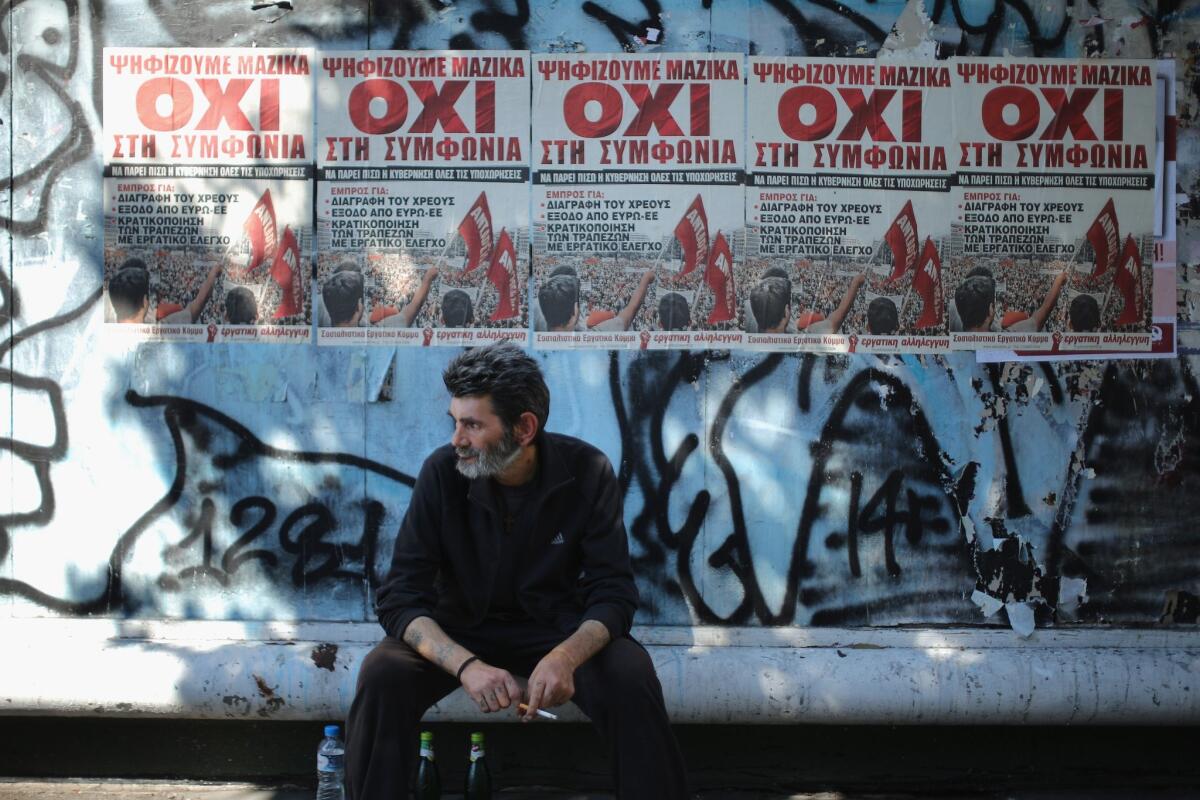Greek court clears way for Sunday’s referendum on bailout terms

A man sits on a bench in front of campaign posters urging voters to vote no in a July 5 referendum on whether to accept terms from Greece’s major lenders for another bailout.
- Share via
Greece’s top administrative court ruled Friday that a referendum on terms offered by the country’s major lenders for another bailout was constitutional, clearing the way for a vote this weekend.
The ruling from the Council of State came amid reports that ATM machines were running out of smaller bills on the fifth day of restrictions limiting Greeks to withdrawals of 60 euros a day, or about $66, and mounting confusion about what is at stake in Sunday’s vote.
In a televised address to the nation, Greek Prime Minister Alexis Tsipras dismissed warnings by the country’s European partners that the referendum will decide whether Greece remains in the euro currency alliance and urged compatriots to vote “no to ultimatums, divisions and fear.”
Tsipras said an analysis by the International Monetary Fund vindicated the government’s position that Greece should not accept more painful spending cuts in exchange for rescue loans without receiving debt relief.
In a report Thursday, the IMF warned creditors that they would need to discount interest rates and extend Greece’s repayment period, as well as provide at least $56 billion in new aid through 2018, to keep the country afloat.
The left-wing government in Athens argues that a “no” vote will help it get a better deal from the country’s main lenders, the IMF, the European Central Bank and the European Commission.
Greek Finance Minister Yanis Varoufakis told Ireland’s RTE radio Friday that an agreement was “more or less done” and that the only issue left was debt relief.
But Dutch Finance Minister Jeroen Dijsselbloem, who heads the Eurogroup that coordinates monetary policy for the 19 countries that use the euro, disputed the statement. He said there had been no new proposals from his side since Greek leaders walked out of negotiations last week and called the snap referendum.
“We are not talking to the government anymore,” he said. “They have chosen an extremely risky route, but we’re now waiting for the result of the referendum.”
Whatever the outcome, he warned, “the future for Greece will be extremely tough.”
“To get Greece back on track and the economy out of the slump, tough decisions will have to be taken, and every politician that says that won’t be the case following a ‘no’ vote is deceiving his population,” Dijsselbloem said.
Greece’s Eurozone partners have been urging voters to accept creditors’ terms to extend the $270-billion package of loans the country received in the past five years -- even though the offer technically expired when the government missed a payment to the IMF on Tuesday. Only a “yes” vote will open the way for negotiations to a new bailout, they say.
Polling has found that most Greeks want to retain the euro as their currency but are divided on whether to accept the latest rescue package.
On the last night of campaigning for the referendum, clashes briefly broke out Friday between police and protesters at a “no” rally in Athen’s Syntagma Square.
Police used pepper spray to deter several dozen youths from throwing rocks and smashing property, the Associated Press reported. The “yes” side was holding a rally about 800 yards away.
For more international news, follow @alexzavis on Twitter
More to Read
Sign up for Essential California
The most important California stories and recommendations in your inbox every morning.
You may occasionally receive promotional content from the Los Angeles Times.











